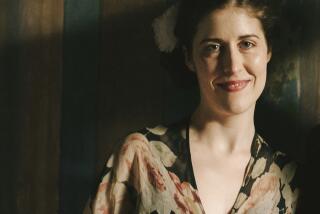Nuanced worlds
Poets of my generation remember when “Alone With America” was published in the 1970s. The title, taken from Perry Miller’s “Errand Into the Wildness,” gave us a glimpse of ourselves (students of poetry and our countrymen) as historical outsiders -- and history itself wrapped in Puritan and post-colonial loneliness: “Having failed to rivet the eyes of the world upon their city on the hill, they were left alone with America.” These essays, “articles of faith,” Richard Howard’s exegesis of 41 poets, included a George Bernard Shaw quote: “If you cannot believe in the greatness of your own age and inheritance, you will fall into confusion of mind and contraiety of spirit.”
The essayist shook off “contraiety of spirit” in dazzling empathy for the poets, including Robert Bly, Adrienne Rich and Carolyn Kizer. Howard may have found himself alone with America, but his faith in these voices represented a leap into a new age of aesthetic community, each “irreducible” poet an original voice.
Voice is a main tenet in Howard’s articles of faith. The poet/critic James Longenbach sees Howard leaning hard on the boundaries of the lyric, “reclaiming discursive territories that over time poetry has ceded to fiction and drama.” With the landmark publication of “Inner Voices” and “Paper Trail,” Howard’s readers are given the luxury of tuning in to decades of this discursiveness. Though Howard, as always, auditions himself: He ascertains that his writing is not so much dramatic as “theatrical.” From a Paris Review interview: “My good dramatic monologues are good because the monologuist is me, the poem is not a game of cribbage.”
At 75, Howard is a distinguished poet, scholar, critic, translator and teacher. He entered belle-lettres through the bound volumes in his grandfather’s library and now, as doyen of American letters, he has surpassed expectations (so American!) that he “re-invent” himself by remaining emphatically who he is. In “Inner Voices,” the reader witnesses the progression from the Auden-like syllabics of his first two books, “Quantities” and “Damages,” into the irrepressible inventions of “Untitled Subjects” and beyond. Writing poetry became an extension of reading for the precocious child, both interior exile (“I didn’t have to look away from home ... just further in ... “) and an opening-out into otherness: “When we consider the stars / (what else can we do with them?) and even / recognize among them sidereal / father figures ... “
Looked at cumulatively, one would expect a Jamesian arc in this work -- the rise to mastery characterized, perhaps, by darker themes in later years, as the “outside” world fails expectation. Explorations of inner life and evolution of character leading to the contemplation of civilization in disarray.
Not so. For example, there’s consistent (albeit ironic) reinforcement of the persona of the teacher in both books. In an age of semi-literacy and screen-thrall, this poet of exquisite consciousness pens a troubled yet deeply sympathetic elegy for a damaged voice, a not-so-talented student (“the unsuccessful poems she had managed to produce”) set in edgy invocation to Sappho. This elegaic portrait of an unhappy woman is reflected in the essay “Sharing Secrets,” in which a hostile female student insults him, taunting his poems’ love of “history” with a withering expletive.
As Baudelaire says (in Howard’s translation), the world is “alive with perplexing messages.” This nuanced world is Howard’s, from “paper trail” to inner voices. The two volumes mirror each other just as the two troubled young women seem twinned in their stunted expressiveness -- practitioners of the “poetry of forgetting.” Here is Howard singing in prose, mourning the losses: “No recurrence, no reversion, no verse -- not the turn but the errant line. When the mind is thus released from its old subservience to repetition, when no experience is reverted to, recuperated, then we get a poetry of revelation without memory ... “ Still, his characters unfailingly, flamboyantly, instruct. Edith Wharton, in a remarkable “two-part invention,” is provided a personal “revelation” about a friend whose ashes she is is bearing to the cemetery in her Delage touring car. From Telemachus to Honore Daumier to Lee Krasner -- Howard’s personae are in transit, en route to new consciousness. If a poem or two here (selected from his twelve books) makes us long occasionally, for freedom from the weighty shadow of Robert Browning, we are reminded, how the dramatic monologue can reconstruct itself in our century, overshadowing yet restoring faith in authorial humility.
In an essay on Marguerite Yourcenar, Howard notes her “Olympian perspective ... an ultimate poetry, so to speak, of reappraisal.” “Against all odds,” he notes, she gives back “truth to the demands of art.” He too has often taken on impossible odds: These two books testify to the rewards his faith in the Olympian perspective provide: poetry and prose of constant reappraisal, giving back truth to the demands of art. “I can meet” he says “a miracle on its own ground” -- and offer the miracle a bit of his own bravura, kept at the ready. *
More to Read
Sign up for our Book Club newsletter
Get the latest news, events and more from the Los Angeles Times Book Club, and help us get L.A. reading and talking.
You may occasionally receive promotional content from the Los Angeles Times.






